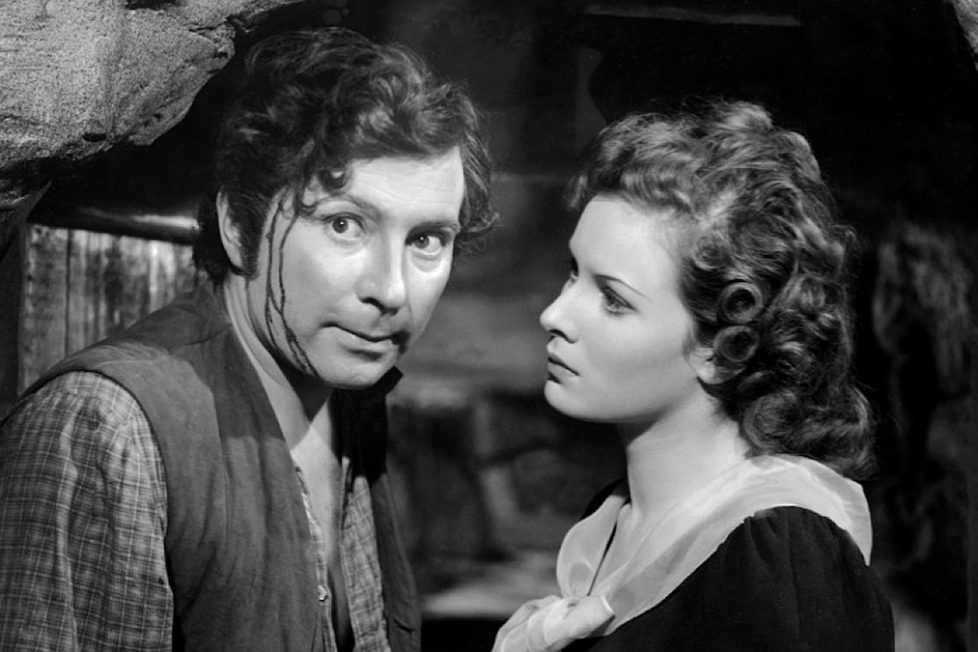JAMAICA INN (1939)
In Cornwall in 1819, a young woman discovers she's living near a gang of criminals who arrange shipwrecks for profit.

In Cornwall in 1819, a young woman discovers she's living near a gang of criminals who arrange shipwrecks for profit.


Alfred Hitchcock most famously adapted the work of Daphne Du Maurier in The Birds (1963), but he was also responsible for bringing the author’s Rebecca (1940) and Jamaica Inn to the screen. The parallels between Hitchcock and Du Maurier are a taste for suspense and mystery, so it is no surprise he was drawn to adapting her work so frequently.
The plot of the film concerns young Mary Yellan (Maureen O’Hara), who in the early part of the 19th-century travels to Jamaica Inn in Cornwall, from Ireland, after the death of her parents, to stay with her aunt and uncle. Little does she know that her uncle Joss (Leslie Banks) is the leader of a group of “wreckers”. Wreckers were practitioners of a particularly brutal crime—by obscuring warning beacons along the coast, gangs would lure ships onto the rocks, kill the surviving crew, then steal and sell their cargo. Here, the gang uses Jamaica Inn as their base of operations. Joss is in cahoots with Sir Humphrey Pengallan (Charles Laughton), the local landed gentry and true mastermind of the scheme, who’s using the resulting profits to fund a lifestyle that’s becoming ever more out of sync with the prevailing mood of the times. Mary stands as a possible spanner in the works to the whole scheme, at the risk of alienating her remaining family.
It should probably be acknowledged early on that Jamaica Inn is generally not a well-regarded movie. It’s been described not only as one of Hitchcock’s worst offerings, but some critics claim it’s one of the worst films ever made. Both Hitchcock and Du Maurier have expressed criticism of the finished feature, sure, but I can’t personally attest to disliking it that much. It’s certainly a bit over the top and hammy in parts—Charles Laughton, in particular, is having a jolly old time as Pengallan, with a loud performance that’s equal part pomposity and flamboyancy—but I felt the film was reasonably enjoyable nonetheless.
Maureen O’Hara, despite sounding like the least Irish person that ever there was, is pleasantly daring as Mary Yellan. I don’t think the film is quite generous enough to her character to laud it for any kind of proto-feminist good, but she’s full of pluck and passion. It’s interesting just to see how differently female protagonists were treated in 1939, and in a way Hitchcock is testing the water in terms of female empowerment. This is in contrast to Marie Ney’s character Patience, Mary’s aunt, a submissive and beaten figure who’s completely in thrall to her husband Joss (Leslie Banks), sporting a magnificently outrageous pair of thigh high boots. As something of a beta male, Joss is an interesting character, as he’s at pains to conceal the fact that he’s not the ringleader of his gang. His relationship with Mary is also interesting, veering from dismissiveness to contempt, and finally to a peculiar kind of respect.
The other main character is Jem Traherne (Robert Newton). Jem’s an undercover lawman in Joss’s gang whose cover is rumbled early and teams up with Mary to bring the gang down. Unfortunately, he’s not the most engaging character, being sort of nominally heroic, without really doing very much of note. That said, he does a lot of the heavy lifting in probably the film’s most exciting scene—a standoff in a cave in the cliffs— and he does look good in a fancy jacket and tie, so perhaps we should give him his due.
From a technical standpoint, the film is well directed (well, it is Alfred Hitchcock) and impresses visually. Seas broil moodily, the period costumes are well designed, and there’s good use of sets and location shooting on Bodmin Moor—site of the actual Jamaica Inn upon which the book was inspired. And which still stands today—although, in reality, it’s much further from the coast than is portrayed here.
So why the critical derision for the film? The main source of consternation seems to be the departure from the book’s darker, more atmospheric mood, in favour of humour and jollity, which is fair enough if you’ve read and enjoyed the book. But having only read The Birds by Du Maurier, this wasn’t something I was let down by. It is pretty cheesy and stagey, but I put this down to simply being a product of its time. You could level the accusation that it is somewhat insubstantial, but whilst this is perhaps the worst you could say of it, I think it does attempt to explore some deeper themes other than young women in peril and the dastardly actions of fiendish criminals—most obviously through the character of Pengallan.
Pengallan is aware of his slow drift towards irrelevance and seems to relish his role as the mastermind behind the wrecker gang, as it once again allows him to control the common folk in a manner that seems to be slipping from his grasp in a legitimate sense. The wrecking operation is a final roll of the dice for him and when the game is up at the end of the film, he embraces his inevitable fate with typical gusto, in what is at once both a bizarre and rather somber finale.
Jamaica Inn is not a film that has aged particularly well, and it’s far from a good starting place for Hitchcock students, but I feel there’s more to like about it than one might expect. Perhaps it’s best left for Hitchcock completists than the average cineaste, but it’s still a more than enjoyable way to spend 90-minutes on a Sunday afternoon.
director: Alfred Hitchcock.
writers: Sidney Gilliat, Joan Harrison, Alma Reville & J.B Priestley (based on the novel by Daphne du Maurier).
starring: Charles Laughton, Maureen O’Hara & Emlyn Williams.
